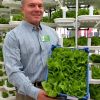
Paignton Zoo gardener branches out
Curator of Plants and Gardens Kevin Frediani is saying good bye to Paignton Zoo Environmental Park after five extraordinary years. He leaves a considerable legacy – but it is as much about people as plants.
Kevin grew up in Ashburton, on the edge of Dartmoor, and has worked for the Queen at Windsor Great Park and at Hortus Botanicus in the Netherlands. “Growing plants in a zoo full of animals is always a challenge – but I think I have helped to realise the potential of plants in what was the world’s first combined zoo and botanic garden.”
Has he done what he set out to do at Paignton Zoo? “Yes and no. I have brought positive change to the plant collection, to the grounds, to the visitor experience and the gardens team. But a garden is never complete, and all around me I see that I could have done more, done it differently, done it better. There are projects I initiated that I will not get to follow through, like a major new tree survey which will evaluate the full economic benefits of our trees.”
Behind the garden that people see on their visit to the Zoo is a living collection of plants. Kevin has added to that collection strategically, focussing on plants for education. “We have a powerful new plant record database, new plant labels, a garden guidebook and run courses on plant science and tree biology. We have a working garden strategy and a plant collection policy to guide future management.” The team has also rediscovered and cultivated plants formerly bred by the Zoo’s founder, Herbert Whitley.
One of Kevin’s big ideas is immersing people in a landscape they can share with the animals without hard architecture like fences appearing to get in the way.
But his remit went far beyond gardening; he has helped prepare the Zoo for climate change and put environmental management at the heart of the park. And then there’s plant conservation. Kevin has worked with important species threatened with extinction, including cycads (palm or fern-like plants found in the tropics and subtropics that have changed little since the Jurassic) and the Plant Heritage National collection of Buddlejas.
Are the grounds in better shape now than when you arrived? “Yes. I base that on feedback from three sources: visitors, peers and colleagues. I hope I have added value to the gardens; I have tried to be an advocate for plants and gardens.”
What are his biggest achievements? “Putting VertiCrop and what is now being called Controlled Environmental Agriculture in front of the Zoo’s visitors. We have demonstrated scientifically that you can produce more food with less energy by growing vertically.”
VertiCrop has now done its job. The working prototype - a world first - has helped to feed zoo animals, but may lead one day to systems that will feed a growing human population. The ideas it represents - vertical growing, urban farming, sustainable food production – are big news in universities and the food industry; the Zoo has conducted trials for some leading names.
“One of my produest achievements has been helping my team to grow. Individuals have trained in botanical curation for their respective areas – they are the ones who have developed the gardens over the last five years while I have focussed on the bigger picture.”
Why is he moving on? “I now have the chance to help train the next generation of future farmers. The Bicton offer is an opportunity of a life time. I always knew I would eventually go into education! We face climate change, a growing human population, the unsustainable harvesting of our natural resources, food insecurity – actions must speak louder than words.”
His list of achievements while at Paignton Zoo is impressive: an RHS Britain in Bloom Judges’ award, the Institute of Horticulture’s Nora Stucken Award, a Devon County Show gold and a Chelsea Flower Show gold, plus accolades from the environmental, business, tourism and zoo worlds.
In between all of that he has given talks at the Natural History Museum, the Royal Botanic Gardens Kew and the World Botanic Garden Congress, among others, published numerous papers and sat on and chaired horticultural committees.
“Winning Loo of the Year, retaining our ISO 14001 environmental accreditation and getting a gold medal at Chelsea in my last year – what a good way to go out!”
Kevin now joins Bicton College, where he will become Head of Academy: Horticulture, Arboriculture and Floristry. He will also be project lead on the new campus at Dartington, to be called Bicton@Dartington.














